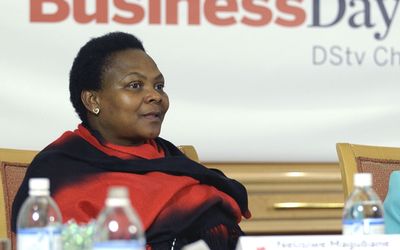COAL remains important to satisfying South Africa’s energy needs, though it is risky to rely on a single energy source, Department of Energy director-general Nelisiwe Magubane said on Thursday.
She was speaking at a Business Day Dialogue on renewable energy, held in Johannesburg in partnership with Nedbank Capital.
The panel included Anton Eberhard of the University of Cape Town Graduate School of Business; Brian Statham, chairman of the South African National Energy Association; Mark Tanton, CEO of Red Cap Investments; Johan van den Berg, CEO of the South African Wind Energy Association; and Michael Peo, head of infrastructure, energy and telecommunications at Nedbank Capital.
Prof Eberhard said South Africa could do more with coal but required a new focus. "It is possible to build more coal-fired power stations, just not the way Eskom is doing it," he said.
Mr Statham also said coal should not be discarded completely. "We should not throw out opportunities for gas, oil and coal," he said.
The Dialogue came soon after the Department of Energy announced its approval of 17 clean-energy projects worth R33bn in the third round of its renewable energy procurement programme, potentially adding 1,471.5MW to the national grid.
The 17 preferred bidders, from 93 bids received, were announced by Energy Minister Ben Martins, who said the projects would contribute R4.4bn to socioeconomic development.
Mr Tanton on Thursday offered some criticism of the government’s strategy on independent producers. "The government wants to achieve (having) a lot of small South Africa-based independent power producers, but it’s not doing that," he said.
He argued further that if the government wanted job creation, localisation and low carbon emissions, it needed to level the playing field.
Ms Magubane, however, said the government supported the idea of a public-private partnership that would form part of the drive to alter South Africa’s energy mix.
The country had already signed off 47 projects to build about 2,400MW in the first and second stages of its clean-energy procurement programme, attracting investments worth an estimated R150bn.
Seven bidders were contracted for the generation of 787MW from onshore wind farms, and six to generate 450MW through solar photovoltaics.
One bidder was allocated 16.5MW for biomass, one was allocated 18MW for landfill gas and two were allocated contracts to build concentrated solar plants generating 200MW.

Department of Energy director-general Nelisiwe Magubane at the Business Day Dialogue in Johannesburg on Thursday. Picture: RUSSELL ROBERTS
COAL remains important to satisfying South Africa’s energy needs, though it is risky to rely on a single energy source, Department of Energy director-general Nelisiwe Magubane said on Thursday.
She was speaking at a Business Day Dialogue on renewable energy, held in Johannesburg in partnership with Nedbank Capital.
The panel included Anton Eberhard of the University of Cape Town Graduate School of Business; Brian Statham, chairman of the South African National Energy Association; Mark Tanton, CEO of Red Cap Investments; Johan van den Berg, CEO of the South African Wind Energy Association; and Michael Peo, head of infrastructure, energy and telecommunications at Nedbank Capital.
Prof Eberhard said South Africa could do more with coal but required a new focus. "It is possible to build more coal-fired power stations, just not the way Eskom is doing it," he said.
Mr Statham also said coal should not be discarded completely. "We should not throw out opportunities for gas, oil and coal," he said.
The Dialogue came soon after the Department of Energy announced its approval of 17 clean-energy projects worth R33bn in the third round of its renewable energy procurement programme, potentially adding 1,471.5MW to the national grid.
The 17 preferred bidders, from 93 bids received, were announced by Energy Minister Ben Martins, who said the projects would contribute R4.4bn to socioeconomic development.
Mr Tanton on Thursday offered some criticism of the government’s strategy on independent producers. "The government wants to achieve (having) a lot of small South Africa-based independent power producers, but it’s not doing that," he said.
He argued further that if the government wanted job creation, localisation and low carbon emissions, it needed to level the playing field.
Ms Magubane, however, said the government supported the idea of a public-private partnership that would form part of the drive to alter South Africa’s energy mix.
The country had already signed off 47 projects to build about 2,400MW in the first and second stages of its clean-energy procurement programme, attracting investments worth an estimated R150bn.
Seven bidders were contracted for the generation of 787MW from onshore wind farms, and six to generate 450MW through solar photovoltaics.
One bidder was allocated 16.5MW for biomass, one was allocated 18MW for landfill gas and two were allocated contracts to build concentrated solar plants generating 200MW.














 Read more about the Business Day Dialogue on renewable energy, presented with Nedbank Capital
Read more about the Business Day Dialogue on renewable energy, presented with Nedbank Capital








Change: -0.47%
Change: -0.57%
Change: -1.76%
Change: -0.34%
Change: 0.02%
Data supplied by Profile Data
Change: -1.49%
Change: 0.08%
Change: -0.47%
Change: 0.00%
Change: -0.04%
Data supplied by Profile Data
Change: -0.34%
Change: 0.03%
Change: -0.10%
Change: -0.22%
Change: -0.81%
Data supplied by Profile Data
Change: -0.28%
Change: -1.15%
Change: -0.07%
Change: -1.21%
Change: -0.22%
Data supplied by Profile Data